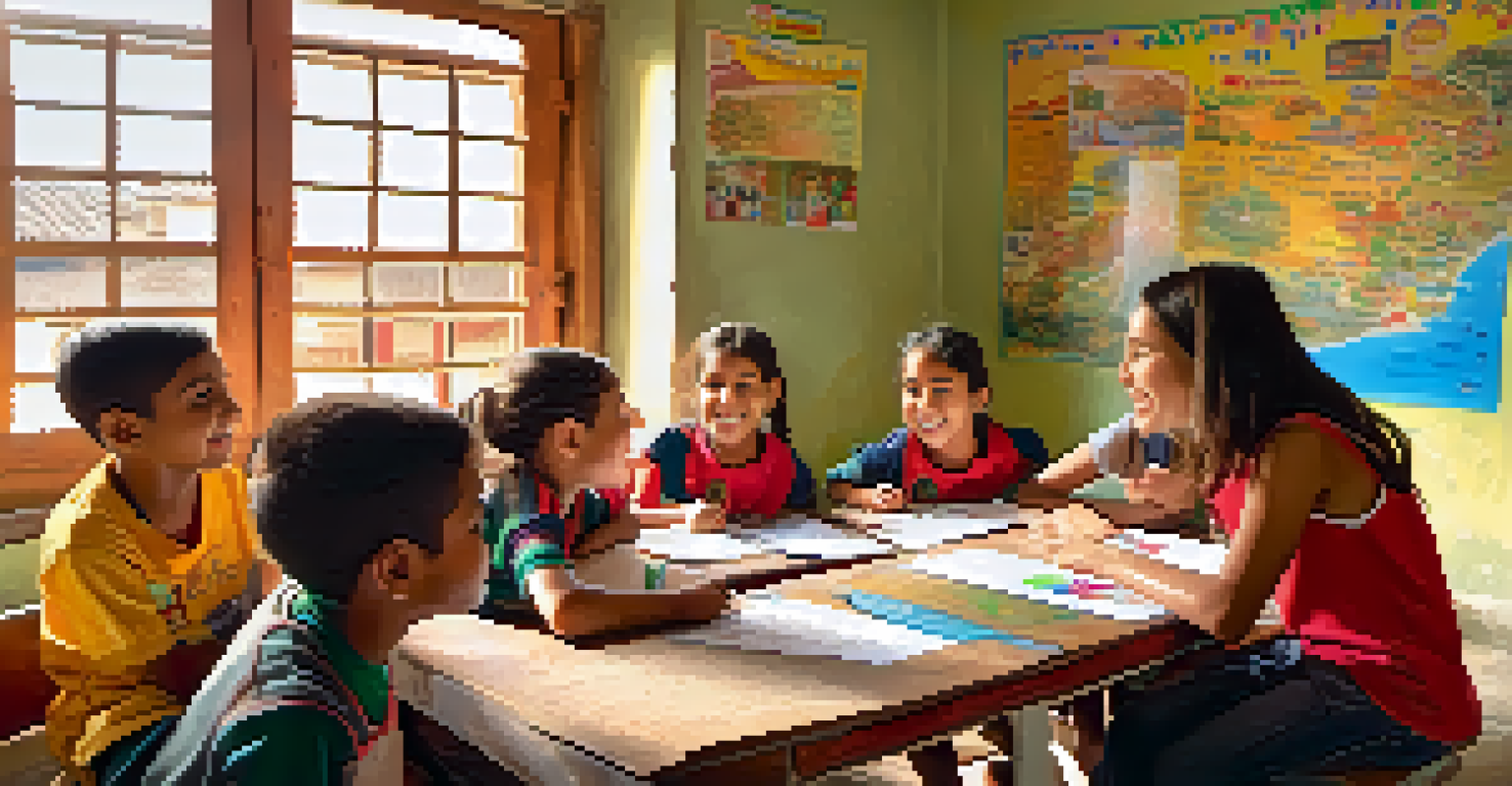Volunteer Tourism: A Sustainable Travel Option in Spain

Understanding Volunteer Tourism and Its Benefits
Volunteer tourism, often known as 'voluntourism,' combines travel with community service. It allows travelers to contribute positively to the places they visit while experiencing local culture. This type of tourism can enrich both the traveler and the host community, creating meaningful connections and shared experiences.
The best way to find yourself is to lose yourself in the service of others.
In Spain, volunteer tourism takes many forms, from environmental conservation projects to social programs that support underprivileged communities. Participants not only engage in hands-on work but also gain insights into the social and environmental issues facing the region. It’s a win-win situation that fosters personal growth and community development.
Ultimately, volunteer tourism encourages sustainable practices by promoting eco-friendly initiatives and social responsibility. Rather than just being a passive observer of a culture, volunteers become active participants, making their travels more impactful and fulfilling.
Popular Volunteer Programs in Spain
Spain offers a variety of volunteer programs catering to different interests and skills. For instance, wildlife conservation projects in places like Doñana National Park allow volunteers to assist in protecting endangered species and preserving natural habitats. This not only benefits the environment but also helps participants connect with nature in a profound way.

Another popular option is teaching English or other skills to local communities, particularly in rural areas where educational resources may be limited. Volunteers can make a significant difference in the lives of children and adults alike, enhancing their opportunities for future success. It’s a chance to share knowledge while immersing oneself in the local culture.
Volunteer Tourism Benefits Communities
Volunteer tourism fosters personal growth for travelers while addressing community needs through targeted programs.
Moreover, many programs focus on agricultural sustainability, where volunteers can work on organic farms. This experience not only promotes eco-friendly farming practices but also educates participants about the importance of local food systems and sustainable living.
The Impact of Volunteer Tourism on Local Communities
Volunteer tourism has a profound impact on local communities, often addressing specific needs through targeted programs. For example, by participating in community development projects, volunteers help improve infrastructure, such as building schools or healthcare facilities. These efforts can have long-lasting benefits for residents.
Traveling – it leaves you speechless, then turns you into a storyteller.
Additionally, the influx of volunteers can stimulate local economies. When travelers engage in volunteer programs, they often spend money on housing, food, and activities, providing a financial boost to the community. This can create jobs and support local businesses, fostering a more sustainable economic model.
However, it’s crucial for programs to be designed with community input to ensure they meet actual needs. When locals are actively involved in shaping these initiatives, the benefits are maximized, leading to stronger and more resilient communities.
Challenges and Considerations in Volunteer Tourism
While volunteer tourism has numerous benefits, it also comes with challenges. One major concern is the potential for 'voluntourism' to reinforce dependency rather than empower communities. It’s essential that programs are structured to promote self-sufficiency and sustainable development.
Another consideration is the environmental impact of increased tourism. Areas that attract large numbers of volunteers may face issues like overcrowding, which can strain local resources and ecosystems. Responsible volunteer tourism should prioritize conservation efforts to minimize such effects.
Choose Programs Wisely
Selecting the right volunteer program involves researching organizations and ensuring alignment with personal values and community needs.
Lastly, volunteers must approach their experience with humility and respect. Understanding the cultural context and being open to learning from local communities can enhance the experience for everyone involved. A genuine desire to contribute positively is key to successful volunteer tourism.
How to Choose the Right Volunteer Program
Selecting the right volunteer program in Spain requires careful consideration of your interests, skills, and the impact you wish to make. Start by researching various organizations and their missions to ensure they align with your values. Look for programs that prioritize sustainability and community involvement.
Read reviews and testimonials from past volunteers to gauge the effectiveness and reliability of the programs. Engaging with former participants can provide valuable insights into what to expect and how to prepare for your journey.
Lastly, consider the duration and location of the program. Spain offers a wide range of opportunities, from short-term projects in urban areas to long-term commitments in rural settings. Choose a program that fits your schedule and allows you to immerse yourself fully in the local culture.
Preparing for Your Volunteer Experience in Spain
Preparation is key to making the most of your volunteer experience in Spain. Start by familiarizing yourself with the local culture, customs, and language. Even learning a few basic Spanish phrases can go a long way in connecting with the community and showing respect for their way of life.
Packing appropriately is also important. Depending on the type of volunteer work, you may need specific clothing or gear, such as durable shoes for outdoor projects or teaching materials for educational programs. Make sure to check with your program coordinator for any specific requirements.
Future of Voluntourism is Bright
As sustainability awareness rises, innovative volunteer programs in Spain are emerging to meet social and environmental challenges.
Lastly, keep an open mind and be adaptable. Volunteer work often involves unexpected challenges, and being flexible will enhance your experience. Embrace the opportunity to learn and grow, as every moment spent volunteering is a chance to make a positive impact.
The Future of Volunteer Tourism in Spain
As awareness of sustainability grows, the future of volunteer tourism in Spain looks promising. More travelers are seeking meaningful experiences that allow them to give back, and organizations are responding by developing innovative programs that address current social and environmental challenges.
The integration of technology also plays a role in shaping the future of volunteer tourism. Online platforms allow travelers to connect with projects easily, making it simpler to find opportunities that match their skills and interests. This accessibility can encourage a broader range of people to participate.

Ultimately, the success of volunteer tourism in Spain will depend on collaboration between travelers, organizations, and local communities. By working together, we can ensure that this form of travel continues to thrive while making a positive impact on the environment and society.